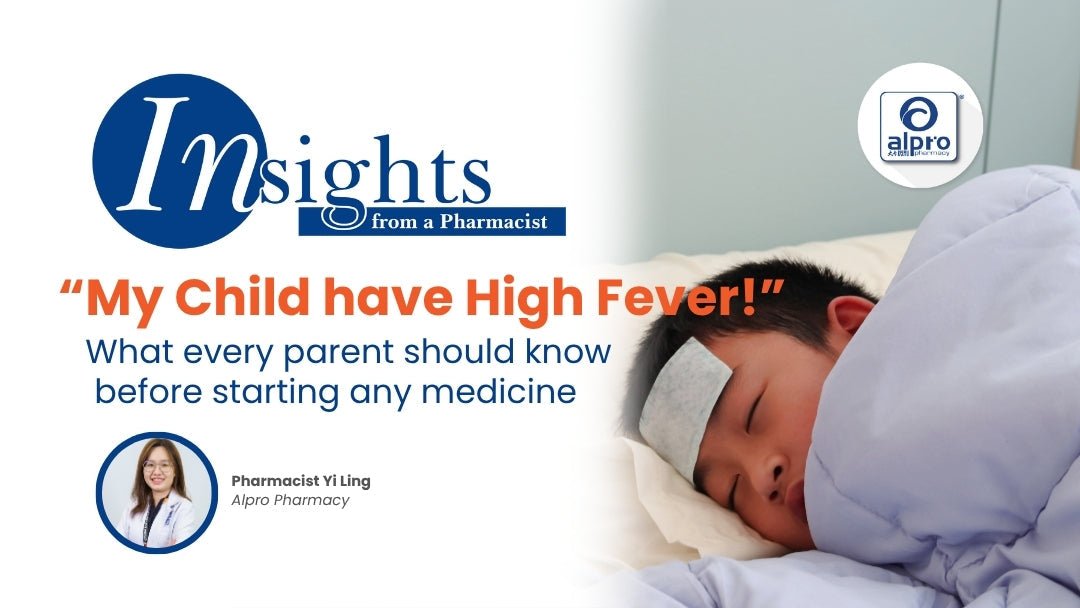
When Your Child Has Fever: Why It’s Important to Check Before Starting Any Medicine
When a child is unwell with fever, parents naturally want to do whatever they can to bring the temperature down quickly. Some may even reach for stronger medicines such as suppositories or tablets used by adults, hoping for faster relief. But not all medicines that reduce pain or inflammation are safe or appropriate for fever in children.
Pharmacists are reminding parents that it’s important to avoid starting or continuing certain medicines like Diclofenac without professional advice. These medicines are not indicated for the treatment of fever in Malaysia currently, and may pose health risks when used during viral infections.
Understanding Diclofenac and Its Purpose
Diclofenac belongs to a group of medicines called non-steroidal anti-inflammatory drugs (NSAIDs). It helps relieve pain, swelling, and inflammation.
However, it is currently not approved for the indication of fever, especially in children. While Diclofenac does have some fever-lowering effects, using it off-label (outside its approved purpose) can be risky — particularly when the fever is due to viral infections such as influenza or dengue.
The Concern: Rare but Serious Complications
The National Pharmaceutical Regulatory Agency (NPRA) in 2023 highlighted that the use of Diclofenac in children with viral infections may, in rare cases, be linked to a serious brain condition called Acute Necrotising Encephalopathy of Childhood (ANEC).
ANEC is a rare but severe inflammation of the brain that typically affects young children with viral fever. Symptoms may include seizures, persistent vomiting, confusion, or sudden drowsiness. The condition can progress rapidly and result in brain damage or even death.
Studies in Japan and Malaysia suggest that Diclofenac may worsen inflammation or interfere with the body’s natural recovery during viral infections. While such cases are uncommon, the risk is serious enough that NPRA advises against using Diclofenac for fever without medical supervision.
What Parents Should Do
If your child has fever even a high one, it is safest to:
- Use Paracetamol, given at the right dose according to the child’s weight, every 4–6 hours if needed.
- Keep your child hydrated with water or oral rehydration salts, as fever increases fluid loss.
- Keep a thermometer at home and record readings to monitor changes accurately.
-
Let them rest, fever is part of the body’s healing process.
If the fever lasts more than three days, exceeds 39°C, or your child becomes weak, drowsy, or develops fits, see a doctor immediately.
If your child has already taken Diclofenac, do not panic! but stop further doses and bring the medicine packaging to the clinic for review. A healthcare professional can assess whether further observation or treatment is needed.
Why You Should Always “Check First”
While some paediatricians may prescribe Diclofenac under specific medical situations, self-medicating or reusing leftover medicines can be dangerous.
Many parents assume a ‘stronger’ medicine works faster, but that’s not always true. Fever is often the body’s natural response to infection. What children need most is comfort, fluids, and the right dose of safe medicine: usually paracetamol. Before starting or continuing any painkiller or suppository, always check with your doctor or pharmacist.
The Bottom Line
🚫 Don’t start Diclofenac (Voren, Cataflam, Voltaren) for fever on your own.
💬 Always check first with your doctor or pharmacist.
✅ Paracetamol remains the safest and most effective choice for most children’s fevers.
For more personalised advice or medicine review, speak to your nearest Alpro Pharmacist or connect with Alpro ePharmacy for professional, evidence-based guidance from the comfort of your home.
Because at Alpro, we believe that Reassurance Brings Smiles.
References
- National Pharmaceutical Regulatory Agency (NPRA). Off-Label Use of Diclofenac Suppositories to Treat Fever in Children: Potential Risk of Acute Necrotising Encephalopathy of Childhood (ANEC). 11 April 2023. https://www.npra.gov.my
- Mizuguchi M, Yamanouchi H, Ichiyama T, Shiomi M. Acute Encephalopathy Associated with Influenza and Other Viral Infections. Acta Neurol Scand Suppl. 2007;186:45-56.
- Lee YL, Abu Hassan H, Ismail IH. Acute Necrotizing Encephalopathy of Childhood: A Severe Case with Fatal Outcome. Mal J Med Health Sci. 2020;16(2):323-325.
- Alfaro RA, Davis DD. Diclofenac. In: StatPearls [Internet]. Treasure Island (FL): StatPearls Publishing; 2022. https://www.ncbi.nlm.nih.gov/books/NBK557879/

